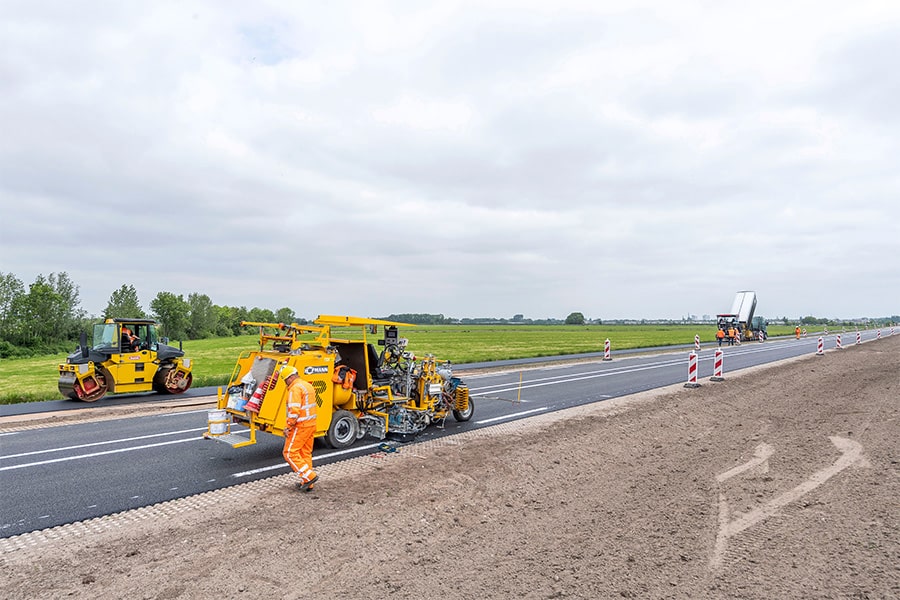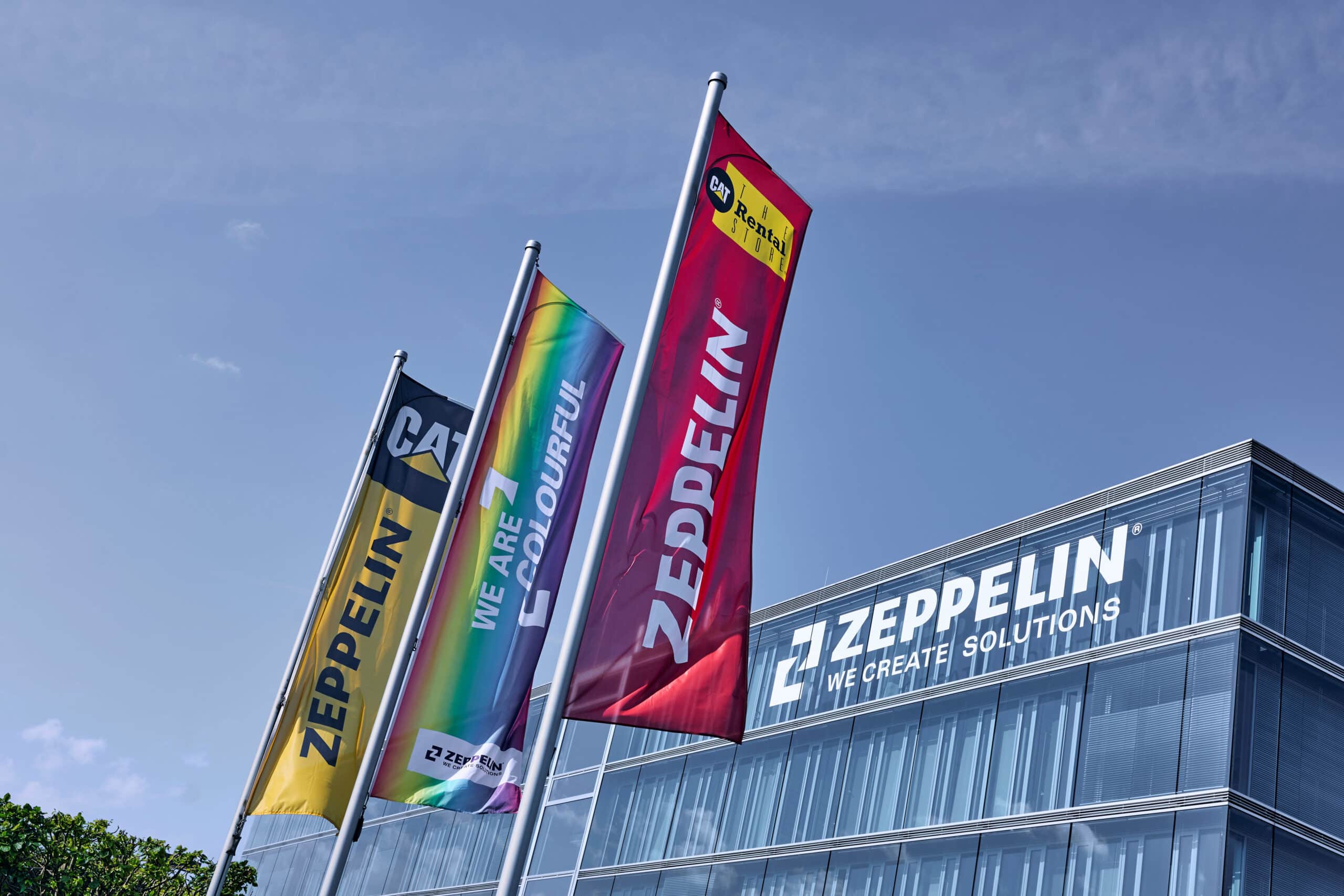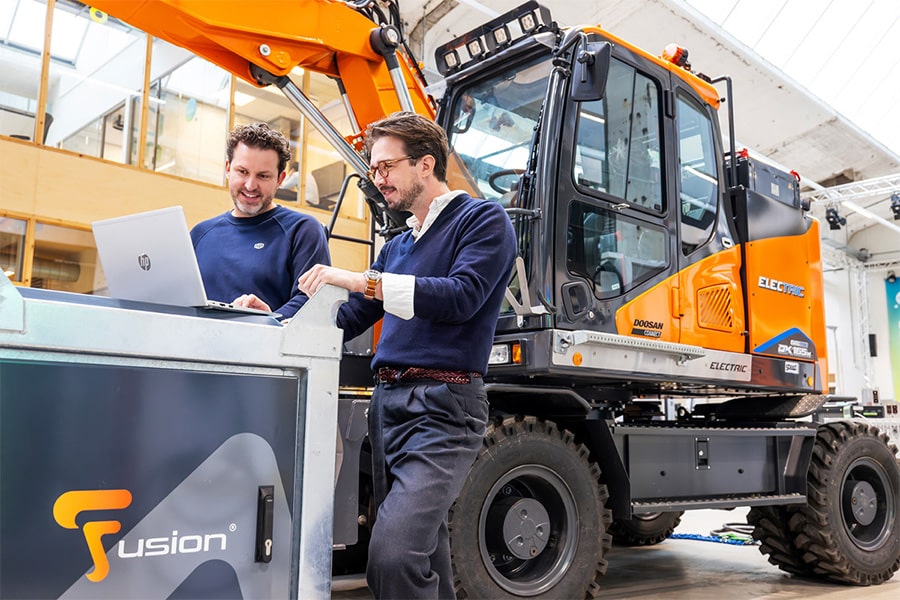
Diversity. Flexibility. Quality.
As one of the major players in the field of civil underwater works, with long-term contracts with Port of Rotterdam NV and Municipality of Rotterdam, Diving Company COW is known for its skilled divers and specialized tools.
Since 2003, Diving Company COW has been working on civil water works throughout the country for RWS, local authorities, contractors and industry. Fred Burchartz, co-owner of Diving Company COW talks about the various disciplines within the organization. "For example, we are engaged in all common work on construction pits, as well as renovation of concrete structures, core drilling, welding and fire work, video inspections, lock renovations, wall thickness measurements, injection, salvage and survey. Wherever we work, whoever we work for, we are enormously versatile, extremely flexible and always go for quality."
Braking assistance
Burchartz cites as an example a project in civil construction: the construction of the second lock chamber in Eefde, where diving company COW performed a large number of disciplines from the start of the project. Rijkswaterstaat is manager of the Eefde lock complex and client for its expansion. "Before the start of this project, brakes had already been installed on the IJssel side. Our certified welders installed the permanent structure and placed and assembled the horizontal driftwood structures underwater."
Wet construction pit
At Eefde lock, the cofferdams of the Lower, Upper Head and cofferdam were excavated in the wet. During the entire process, from the initial inspection to the installation of the underwater concrete floor, a lot of diving is involved. Burchartz explains that when opting for a wet construction cofferdam with underwater concrete, it is very important that all the work involved be carried out in a safe, professional and efficient manner. "For example, the Gewi anchors, which were installed before excavation from ground level, must be stripped of a grout column. This has a diameter of about 200 mm and our professionals remove the grout column using a hydraulic pincer and/or jackhammers without damaging the threads of the Gewis. It is then a matter of the divers applying and fixing the dishes at exactly the right height. When the underwater concrete is poured, these bulkheads are part of the underwater concrete and act as tensile anchors to hold the concrete floor -against the groundwater pressure- in position."

Sheet pile repair and cleaning work
"Sometimes on a project it happens that some soil retaining or structural repairs need to be done, for example, for a sheet pile that has run out of lock. In consultation with the client and structural engineer, repairs are made by our certified welders to ensure that the soil behind the sheet piling cannot enter the tub and then concrete can be poured without problems." Burchartz continues: "To ensure a good and watertight bond, it is important that the contact surface of the underwater concrete and the sheet piling is cleaned under high pressure."
Underwater concrete
"When applying underwater concrete, you have the choice of a pouring tube fitted with a valve or with a float. In the case of the Upper and Lower Abutments at Eefde Lock, the valve was chosen because there are smaller vessels in which there are no outrigger frames. In the lock chamber, however, a floater was used because the entire floor had to be reinforced concrete. With reinforced underwater concrete, a number of things are crucial: the margins when excavating in the wet are smaller and the construction of the reinforcement baskets plays a major role. Think about the dimensions, strength, the method of connecting the precast reinforcement elements." Burchartz says the gully-wide reinforcement baskets, manufactured elsewhere, were brought in by water, shipped to the old lock and placed in the new gully by COW using a crane. "We carefully made all the preparations so that the baskets could be placed one by one at the correct height. Our divers place the baskets clear of the bottom at the correct height with minimal tolerance. They then connected the baskets together and welded them to the sheet piling and piles to fix them in place. In total we are talking about 110 meters of reinforcement on the ground, on which the concrete could be poured. Then you also have to take into account the flow-through
capacity of the underwater concrete.
The composition and flow rate of the underwater concrete was adjusted to 650-750 mm so that good flow could be guaranteed. A constant quality of the concrete and its constant supply, are crucial factors to achieve a good end result, hence the choice to pour at the large gully along the top with a float."
Colloidal concrete
As a final discipline within project lock Eefde, Burchartz mentions the application of colloidal concrete. "That is used to interconnect poured stones and thereby prevent leaching." COW has a pouring and registration system that allows the right amount of colloidal concrete to be applied at the right location."
Underwater specializations
In addition to the above disciplines, Diving Company COW is known for various other underwater specialties such as those used in maintenance and inspection of locks. For the inspection of old quay and bridge structures, COW has in-house specialists and specific inner-city equipment. "Reconstructing and renovating monumental structures is a profession in itself. Just like providing high-quality concrete repairs in both fresh and salt water according to a strict protocol. But applying anodes to protect combi and sheet pile walls is also a specialty of COW," Burchartz says. "We do this mainly for various port companies, such as HBR, Groningen Seaports and Zeeland Seaports, where high demands are made on preparation, delivery, working methods, registration and safety. We are therefore proud to have already completed a large number of projects to customer satisfaction!"
Above-water specialization
In addition to all of COW's underwater work, the company is also known for its specialization in damage-free shaft removal, above water. "In turn, this is often done high above the water, for example on cranes lifting containers in ports. Using a thermal lance, a seized or worn axle is removed without damage to bearings or the surrounding structure. A fine piece of craftsmanship," says Burchartz, "to use 13 bars of oxygen and temperatures up to 5200 degrees to get a shaft through. And that too under great time pressure, because jamming is downtime. Our craftsmen can remove virtually any size shaft within hours and a new shaft can be put back in place." Even on large projects where time is a leading factor, the demolition of, say, an old railroad bridge with doubled steel trusses can be done in a fraction of the time of a traditional demolition burner. The gains to be made from hiring very heavy cranes and planning for the re-routing of the track are obvious."

Flexibility
In addition to the diversity of disciplines, flexibility is an important pillar within COW. One that is highly appreciated by the clients who work with COW. "Switching fast, switching up and reacting where necessary, that's what we stand for. With our calamity contracts we are on standby for clients 24/7 and many calamities are solved within a few hours. If that fails, we carry out an emergency repair to apply a definitive solution at a later stage."
Quality
"Whether it's a long-term project or a rush job, we always go for quality! But without a motivated team with passion for the job, we are nowhere. You don't become an all-round diver overnight; it takes years of education and training. And you never stop learning. The fact that Peter Bosman and I come from a diving suit is an advantage for COW, because we understand that this profession should be passed on from generation to generation. In the interest of quality, we strive to make our people All-round as quickly as possible through our own experienced men and the permanent shell of very experienced freelancers. In addition, we try to let the men specialize in the area where their passion lies. This way you put people in their power and they deliver the best performance. One man can prepare and execute a highly technical job in detail, while another can prepare and report on an inspection to perfection. And then there are the guys who are not happy until all the anodes for the day's production are off deck and registered according to protocol."
The quality of COW's work is not only reflected in the individual certification of the welders, but COW is also the first company in the Netherlands to be certified according to the valid standard of welding procedures. In addition, COW has ISO certifications and a VCA** in petrochemicals (the highest VCA you can achieve as a contractor, attesting to the necessary professionalism). Burchartz concludes, "This makes Diving Company COW not only one of the big players in the field of Civil Underwater Works, but an absolute reliable partner with expertise."



